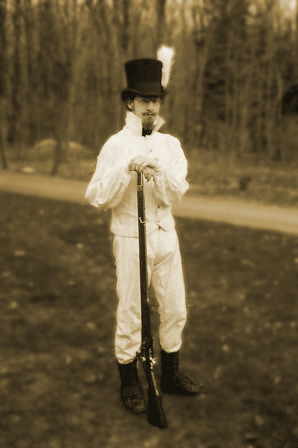

 I am part of the 2nd Michigan Militia, LaCroix's Company, a unit created
in 1806. Our major event takes place on or near the anniversary of The
Battle of the River Raisin, which started with a skirmish on January 18th
1813. This battle took place in and around the Frenchtown settlement,
in what is now Monroe, Michigan. My first event was January 17th 2004.
The bicentennial of the battle is fast approaching and the friends of
the battlefield organization has applied for national battlefield preservation
recognition. If achieved this will result in a grant that will allow us
to rebuild much of the original Frenchtown settlement. This property is
now under a condemned paper mill and owned by the city. The grant will
provide the money for demolition of this structure.
I am part of the 2nd Michigan Militia, LaCroix's Company, a unit created
in 1806. Our major event takes place on or near the anniversary of The
Battle of the River Raisin, which started with a skirmish on January 18th
1813. This battle took place in and around the Frenchtown settlement,
in what is now Monroe, Michigan. My first event was January 17th 2004.
The bicentennial of the battle is fast approaching and the friends of
the battlefield organization has applied for national battlefield preservation
recognition. If achieved this will result in a grant that will allow us
to rebuild much of the original Frenchtown settlement. This property is
now under a condemned paper mill and owned by the city. The grant will
provide the money for demolition of this structure. |
| Miscellaneous
|
|||
My Second Event, The Battle of Longwoods (May 1 and 2, 2004), was probably the most fun I’ve ever had to date. The event was held just outside London, Ontario in the Longwoods Conservation Center. I brought two of my friends along, Peck and Andrea. Peck I had convinced of our just cause, and he came under arms in period civilian attire. Andrea shot most of the pictures you’ll see here. Day one was an unscripted battle in which the U.S. forces were to lose. The 2nd Michigan Militia was sent to guard the left and rear flank, more specifically 2 paths, a trail through the woods and a bridge over a small creek. We sent scouts ahead to see if the redcoats’ position could be determined. The one sent down the forest path returned with news of a large force waiting at its end. We deployed in single file against the wood line ahead of the bridge’s outlet in order to conceal our presence. The other scout remained a look out on the far end of the bridge. When movement could be heard down the forest path we pulled the bridge scout back to bolster our ranks. There we waited. But as the forest path erupted in red coats our rear guards spotted an equally large force crossing the bridge. Immediately we pulled back so that both positions were ahead of us and gave fire. Each of the attacking forces by themselves outnumbered us. We took heavy losses. Even with some reserve support from the main unit of regulars, over half of our unit was killed or wounded. At one point the lobsterbacks, seizing the initiative, executed a bayonet charge on our retreating forces with a bone-chilling cry of “HUZZAH!” The 2nd Michigan, while almost totally annihilated, achieved our goal that day by delaying the British advance. Our unit was commended for its bravery by our overall commanding officer.Day two, our revenge, was a re-enactment of the actual Battle of Longwoods, a U.S. victory. It was damp and we feared our muskets would not perform, but God was on our side. After the initial battalion volley the light infantry moved forward to engage the enemy and draw them in. The 2nd Michigan was kept in reserve. After some time of fighting we were moved up to a small breastwork, which we were instructed to defend. The lights pulled back and we opened fire, driving the British back with volley after volley. The British reformed and attacked several more times but their volleys were ragged. The damp weather it seems had affected some… The last British thrust came in hard and fast to a cry of “HUZZAH!” reminiscent of the day before. This time however, it was we who held the high ground, and the initiative. The orders to make ready and to take aim came in quick succession. Waiting until the redcoats were within yards of our muzzles, the commanding officer finally gave the order to fire. A flawless battalion volley brutally ripped the British charge apart. This was followed by two rounds of rotating company volleys to discourage any more attacks. The British fled, having suffered devastating loses. It was then that the 2nd Michigan was given the order to advance and drive the remaining redcoats from the field of battle. Stepping over the dead we did so. I myself stepped over the British drummer, who had sustained a fatal wound. We emptied our remaining three charges into the ragtag retreating British forces and drove them off. Our unit fired 23 volleys in all. Three cheers rang out: hip hip HUZZAH, hip hip HUZZAH, hip hip HUZZAH! |
|
Longwoods 2004 |
|||
May
29, 1813 We are bivouacked at Fort Meigs. Scouts have reported a large British force headed this way. I've heard them to be about 10 miles out. That would mean they should arrive around 3pm if they hold their pace. The fort is all noise and clatter whilst men prepare, oiling their locks, checking cartridges, replacing flints. We shall make a good account of ourselves when they arrive and pay them back for the horror of the raisin. May 31, 1813 The last to days saw horrifically fierce battles. The British arrived at 2pm on the 29th making better time than I had estimated. Our pickets hurriedly returned at about a quarter past one raising the alarm. The drummers summoned the men and we all stood stock still listening to our commanding officer's inspiring words. When the red coats arrived the second was deployed as light infantry skirmishers to test their strength and draw them closer to the stockades. We were almost immediately pushed back by the surprising number of opposing forces spilling from the trees. The second pulled back into the fort to lick its wounds as the regulars garrisoned there exited in column to beat back the foe. Once the second's wounded had been attended to, we redeployed on the left flank of the regulars, firing volley after volley into the thin red line. Several of our men took hits, one falling flat on his face, dead as he fell with a ball in his skull. The Brits pulled back hoping to draw us away from the fort but to no avail. Our forces retired back inside the stockade. The next day we engaged the enemy again, and again the second led the way. Volley after volley we poured into their lines but it seemed to little effect. Then our cavalry came and harassed them into square. It was then that our fortunes turned and the stalemate was at an end. Just as the horses wheeled away from the square our hitherto silent artillery opened up simultaneously. All five of our guns, two sixes and three four pounders, all with double canister poured shot into the tightly packed square. British losses were terrible. The flanks of the square were turned instantly into a red mist. Such carnage cannot be imagined, only witnessed first hand. Given the order to fix bayonets, we drove the survivors from the field with shouts of "HUZZAH!" A man to my left shouted, "SOUVENIR LE RAISIN!" reverting, in the exitement, to his native French. I have spent the greater part of today attending to my uniform in hopes to remove some of the mud caked about my shoes and gaiters and to the cleaning of my firelock during which I sustained a rather unpleasant laceration from the flint as I removed it. It is for these reasons that I am writing this entry in the late evening rather than the early morn, as is my custom. God ever guides my actions and preserves me from ruination in this noble endeavor. God save the United States. |
| First
Siege 1813, The War of 1812 Grand Tactical, Fort Meigs 2004
|
|||
|
|
Fort Meigs photgrapy by Vivian Souders |